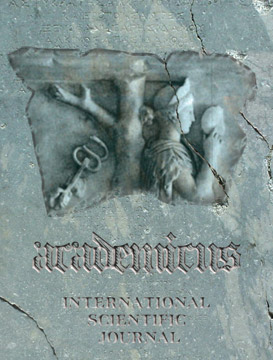Title:
Locus of control and culture of poverty. An appraisal of Lawrence M. Mead’s ideas in ‘Culture and Poverty’
Full Reference List:
| 1. | Bandura, A., Barbaranelli, C., Caprara, G. V., & Pastorelli, C. (2001). Self-efficacy beliefs as shapers of children’s aspirations and career trajectories. Child Development, 72 (1), 187-206. https://doi.org/10.1111/1467-8624.00273. |
| 2. | Caliendo, M., Cobb-Clark, D., & Uhlendorff, A. (2010). Locus of Control and Job Search Strategies. Discussion Paper No. 4750. Available at: http://ftp.iza.org/ dp4750.pdf |
| 3. | Campos, F., Frese, M., Goldstein, M., Iacovone, L., Johnson, H. C., McKenzie, D., & Mensmann, M. (2017). Teaching personal initiative beats traditional training in boosting small business in West Africa. Science, 357, 1287–1290. https:// doi.org/10.1126/science.aan5329 |
| 4. | Ferrarotti, F. (2014). Culture and Counter-culture.Ferrarotti, F. (2014). Academicus International Scientific Journal, Special Issue, DOI: https:// dx.medra.org/10.7336/academicus.2014.special.03 |
| 5. | Fitzgerald, C.S., & Clark, S. (2013). Work Locus of Control and Perceptions of Practice. Journal of Public Child Welfare, 7 (1), 59-78. http://dx.doi.org/10.108 0/15548732.2012.738185. |
| 6. | Furnham, A., & Henry, J. (1980). Cross-Cultural Locus of Control Studies: Experiment and Critique. Psychological Reports, 47(1), 23–29. https://doi. org/10.2466/pr0.1980.47.1.23. |
| 7. | Goodman, A., Joshi, H., Nasim, B., & Tyler, C. (2015). Social and emotional skills in childhood and their long-term effects on adult life. Institute of Education, University College, London. Available at: https://www.eif.org.uk/report/social- and-emotional-skills-in-childhood-and-their-long-term-effects-on-adult-life |
| 8. | Heaven PCL (1989) Economic locus of control beliefs and lay attributions of poverty. Australian Journal of Psychology, 41 (3), 315-325. https://doi. org/10.1080/00049538908260093. |
| 9. | Hofstede, G. (1991/1994). Cultures and Organizations: Software of the Mind. London: HarperCollinsBusiness. |
| 10. | Hui, C. C. H. (1982). Locus of control: A review of cross-cultural research. International Journal of Intercultural Relations, 6 (3), 301-323. https://doi. org/10.1016/0147-1767(82)90036-0. |
| 11. | Huizing, R. L. (2015). Who’s Controlling Locus of Control? Cross-Cultural LOC Usage. International Journal of Leadership Studies, 9 (1), 76 – 88. Available at: https://www.regent.edu/acad/global/publications/ijls/new/vol9iss1/3-IJLS. pdf |
| 12. | Kluchhohn, C., & Kelly, W. H. (1945). The concept of culture. In R. Linton (Ed.), The science of man in the world crisis (pp. 78 – 105). New York: Columbia University Press, |
| 13. | McCarty, M. K., & Ramlakhan, K. (2018). Locus of Control. In V. Zeigler-Hill and T. Shackelford (Eds.), Encyclopedia of Personality and Individual Differences. Cham: Springer. https://doi.org/10.1007/978-3-319-28099-8_1799-1 |
| 14. | Mead, L. M. (2020). Poverty and Culture. Society. Available at: https://doi. org/10.1007/s12115-020-00496-1 (accessed 25 July 2020). Retracted on July 31, 2020. |
| 15. | Medinnus, G. R., Ford, M. Z., & Tack-Robinson, S. (1983). Locus of Control: A Cross-Cultural Comparison. Psychological Reports, 53(1), 131–134. https://doi. org/10.2466/pr0.1983.53.1.131. |
| 16. | Nasser, R., & Abouchedid, K. (2006). Locus of Control on the Attributions for Poverty: Comparing South Africans and Lebanese University Students. Social Behavior and Personality, 34 (7), 777-798. |
| 17. | Ng-Knight, T., & Schoon, I. (2017). Can locus of control compensate for socioeconomic adversity in the transition from school to work? Journal of Youth and Adolescence, 46, 2114–2128. https://doi.org/10.1007/s10964-017-0720-6 |
| 18. | Oppong, S. (2014). Psychology, economic policy design, and implementation: Contributing to the understanding of economic policy failures in Africa. Journal of Social and Political Psychology, 2 (1), 183 – 196. https://doi.org/10.5964/ jspp.v2i1.306 |
| 19. | Orth, U. (2018). The family environment in early childhood has a long-term effect on self-esteem: A longitudinal study from birth to age 27 years. Journal of Personality and Social Psychology, 114, 637-655. http://dx.doi.org/10.1037/ pspp0000143. |
| 20. | Osei-Tutu, A., Dzokoto, V. A., Adams, G., Hanke, K., Kwakye-Nuako, C., Adu- Mensa, F., & Appiah-Danquah, R. (2018). ‘My Own House, Car, My Husband, and Children’: meanings of success among Ghanaians. Heliyon, 4 (7). https:// doi.org/10.1016/j.heliyon.2018.e00696. |
| 21. | Ross, P. H. (2018). Ancestral Roots of Locus of Control. Available at: http:// barrett.dyson.cornell.edu/NEUDC/paper_482.pdf. |
| 22. | Rotter, J. B. (1966). Generalized expectancies for internal versus external control of reinforcement. Psychological Monographs, 80 (1), 1–28. |
| 23. | Spencer-Oatey, H. (2008). Culturally Speaking: Culture, Communication and Politeness Theory (2nd ed). London: Continuum. |
| 24. | Spencer-Oatey, H. (2012). What is culture? A compilation of quotations. GlobalPAD Core Concepts. Available at: https://warwick.ac.uk/fac/soc/al/ globalpad/openhouse/interculturalskills/global_pad_-_what_is_culture.pdf. |
| 25. | Stocks, A., April, K. A., & Lynton, N. (2012). Locus of control and subjective well- being – a cross-cultural study. Problems and Perspectives in Management, 10 (1), 17 – 25. |
| 26. | United States Army Military Personnel Center. (1979). A Study in Procedural Manipulation of Locus of Control. Available at: https://ia800805.us.archive. org/10/items/DTIC_ADA068658/DTIC_ADA068658.pdf |
| 27. | Van Elk, M., & Lodder, P. (2018). Experimental Manipulations of Personal Control do Not Increase Illusory Pattern Perception. Collabra: Psychology, 4(1), 19. http://doi.org/10.1525/collabra.155 |
| 28. | Wang,Q., Bowling,N.A.,&Eschleman,K.J.(2010).Ameta-analyticexamination of work and general locus of control. Journal of Applied Psychology, 95(4), 761- 768. https://doi.org/10.1037/a0017707 |
Back to article
Academicus
International Scientific Journal
pISSN 2079-3715
eISSN 2309-1088
Address:
Sheshi i Flamurit, Rruga Muze
Al-9401 Vlorë, Albania
Tel: +355 68 60 60 555
info@academicus.edu.al
https://academicus.edu.al


